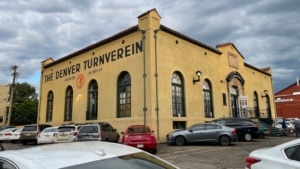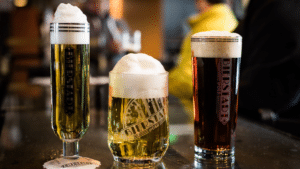DCPA NEWS CENTER
Enjoy the best stories and perspectives from the theatre world today.
Enjoy the best stories and perspectives from the theatre world today.
German culture has been prevalent in Colorado for over a century, even before the state’s governmentally recognized establishment in 1876. In fact, the Colorado constitution was published in three languages: English, Spanish, and German. At the time, German immigrants made up the largest segment of the state’s foreign-born population.
In their struggle to establish roots in a new country, immigrants relied on saloons as both a haven for old world culture and an introduction to their new home. By 1880, more than 1/3 of Denver saloons were German-owned. The best-known of these establishments was Turn Hall (Turnhalle), established in 1889.
Today, a saloon might only be a place with sticky floors and a crowded bar. But in 1889, Turn Hall was a hub of activity, featuring a social club, theatre, meeting and dining rooms, a fencing room, and more. In German, this kind of organization is known as a Turnverein.
Both the Turnverein organization and building are still in Denver, though not together. The original, glamorous 1889 building faced hard times at the beginning of World War I. Anti-German sentiment was rampant, and Turnverein memberships dropped leading to a bank foreclosure on the unpaid mortgage. In 1920, the building burned.
Surprisingly, much of the ground floor’s structure still exists. The cornerstone is still there, but now it marks the home of a car garage. You can still see it at 2140 Arapahoe Street.
 The Turnverein organization now lives at 1570 Clarkson Street, in another historic building constructed in 1921. It hosts dance classes every day and several events throughout the year.
The Turnverein organization now lives at 1570 Clarkson Street, in another historic building constructed in 1921. It hosts dance classes every day and several events throughout the year.
The original buildings and landmarks showing Colorado’s connection to Germany may have diminished over the years, but there are still several ways to celebrate German culture in the area.
In the 1980s, German Americans formed a trade association, now known as the German American Chamber of Commerce (GACC). Each year the chamber publishes a directory of German businesses, experiences, and restaurants across the state.

Photo courtesy Bierstadt Lagerhaus
Some well-known establishments include Bierstadt Lagerhaus, a traditional German brewery and taproom in RiNo; Edelweiss, a beloved German restaurant in Colorado Springs; and Prost Brewing, a popular brewery with four locations across the Denver-metro.
The GACC also supports Denver’s annual Christkindlmarket, Colorado’s only authentic German market. This is a holiday favorite among locals in Civic Center Park. The market is free and open to the public every day from November 22 to December 23.
Whether truly authentic or not, there are also several Oktoberfest festivals that take place throughout the metro area each fall. These celebrations can get rowdy from the steins of German beer served, but are intended to honor German culture, agriculture, and history. The two largest in Colorado are Breckenridge Oktoberfest, held annually for a long weekend on Breckenridge’s Main Street, and Denver Oktoberfest, a two-weekend long affair in Denver’s Ballpark neighborhood.
Lastly – be sure to check out Gutenberg! The Musical! at the Garner Galleria Theatre through May 4. The musical tells the (sort of) true story of German inventor Johannes Gutenberg. It may not be authentically German, but it is definitely a fun time.
